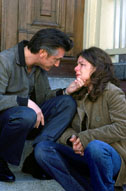
Movie Guru Rating:

Comment
on this review
| |

Morals are beside the point in Eastwood's tragedy
by Jesse Fox Mayshark
This year's major Oscar contenders are a pleasantly kooky bunch: hobbits, horses, sailors (of both the noble and piratical variety), Rio slum gangsters, Maori urchins, Tokyo agonists. You've got your female serial killers, your Iranian expatriates, your hillbilly wild women. Multinational, multilingual, multiracial (especially if elves and orcs count)—it's all very 21st century.
Which is why Clint Eastwood's Mystic River seems like the odd movie out. Almost alone among the marquee nominees, it is an old-fashioned Hollywood "quality" production: big stars, big director, big issues, big sense of self-importance. It dominates the prestige categories (three acting nominations, plus nods for directing, adaptation and Best Picture), and it's hard not to notice that Eastwood is the only white American male up for best director. Or that the only major category where the movie didn't show up was best actress; women are important in Mystic River, but only insofar as their actions affect men.
The movie came out some months ago, of course, but it fell through the holiday holes in Metro Pulse's review schedule. So we can consider it now in the context of its fellow Academy aspirants. What sets it apart from nominally traditional fare like Seabiscuit and Master and Commander, not to mention Tolkien's epic rah-rah and Sofia Coppola's gentle confection, is its pervasive sense of doom. Mystic River is uncompromisingly grim from the tracking shot of the slate-gray title waterway that opens the film to the amoral coda that closes it. It's hard to imagine the Academy choosing Eastwood's brutal psychodrama over a host of fables where the good guys actually win.
Adapted from Dennis Lehane's novel, Mystic River has the form of a pulpy police procedural but the ambitions of Shakespearean tragedy. It's about three men who grew up together in working-class South Boston: Jimmy (Sean Penn), an apparently reformed street tough who owns a neighborhood convenience store; Dave (Tim Robbins), a shambling, morose husband and father; and Sean (Kevin Bacon), a police detective. Although they've grown apart, they're bound together by something that happened when they were kids: As the three were playing in the street, a car pulled up and two men got out and, pretending to be cops, kidnapped Dave. They kept him prisoner in a basement and raped him for days before he escaped.
The three are brought together again when Jimmy's teenage daughter turns up murdered in a park, on a night that Dave arrives home mysteriously late and bloody. In a movie driven by overlapping coincidences (or what Eastwood would probably call fate), Sean catches the case and is forced to confront both of his childhood friends.
The movie has a lot going for it, starting with its cast. Although Penn's soulful tough-guy routine isn't as fresh as it used to be, he's still a visceral presence; watching him is always a little like getting punched in the gut. Bacon is typically understated in the movie's least interesting role (a subplot about his marital troubles feels tacked on). But Robbins is the real deal here. Everything about his performance, from Dave's slightly hunched shoulders to his difficulty looking people in the eye, suggests a man with deep wounds—a survivor, but a crippled one. Likewise, Marcia Gay Harden is touchingly confused as Dave's uncomprehending wife Celeste, who wants to believe her husband has moved past what happened in that basement. Harden and Robbins' scenes together, in which he unravels as she recoils in denial and fear, are the best minutes of the movie.
But all the emotional honesty and sociological fidelity adorns a basically ludicrous plot. By the time the tragic conclusion arrives, it's been undermined by a series of outlandish implausibilities. Eastwood and his actors treat the material like they're playing King Lear, but what they're really working with is the stuff of a sub-par Law and Order episode. And a bizarre late scene in which Jimmy is comforted by his suddenly merciless wife (Laura Linney, otherwise barely a factor in the film) seems beamed in from some other movie altogether.
Still, Mystic River fits Eastwood's latter-day obsession with revenge and redemption (or the lack thereof). The man who once was Josey Wales has become skeptical about the potential of violence to do anything but create more violence. As in the superior Unforgiven, the "justified" violence in Mystic River turns out to be anything but. On the other hand, the movie's ambiguous ending carries more resignation than outrage. In Eastwood's moral system, it's still better to be a victimizer than a victim, if only because the victimizers stay alive.
And that may explain Mystic River's appeal right now. However much we'd like to pretend, and however many times our president says it, it's hard for many Americans to see ourselves as Capt. Aubrey or Frodo Baggins, boldly facing down the forces of evil on behalf of king, country and shire. We can't credibly play the underdog either, and our innocence abroad is very much in doubt, with or without Scarlett Johannson in tow. But Mystic River's vision of a Hobbesian world bound by blood feuds, where terrible acts bring swift if sometimes faulty responses, is almost comforting.
The strong are not better than the weak, Eastwood suggests; but they are stronger.

February 12, 2003 * Vol. 14, No. 7
© 2000 Metro Pulse
|